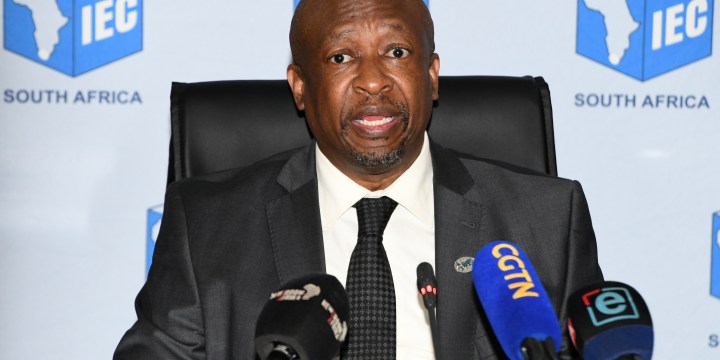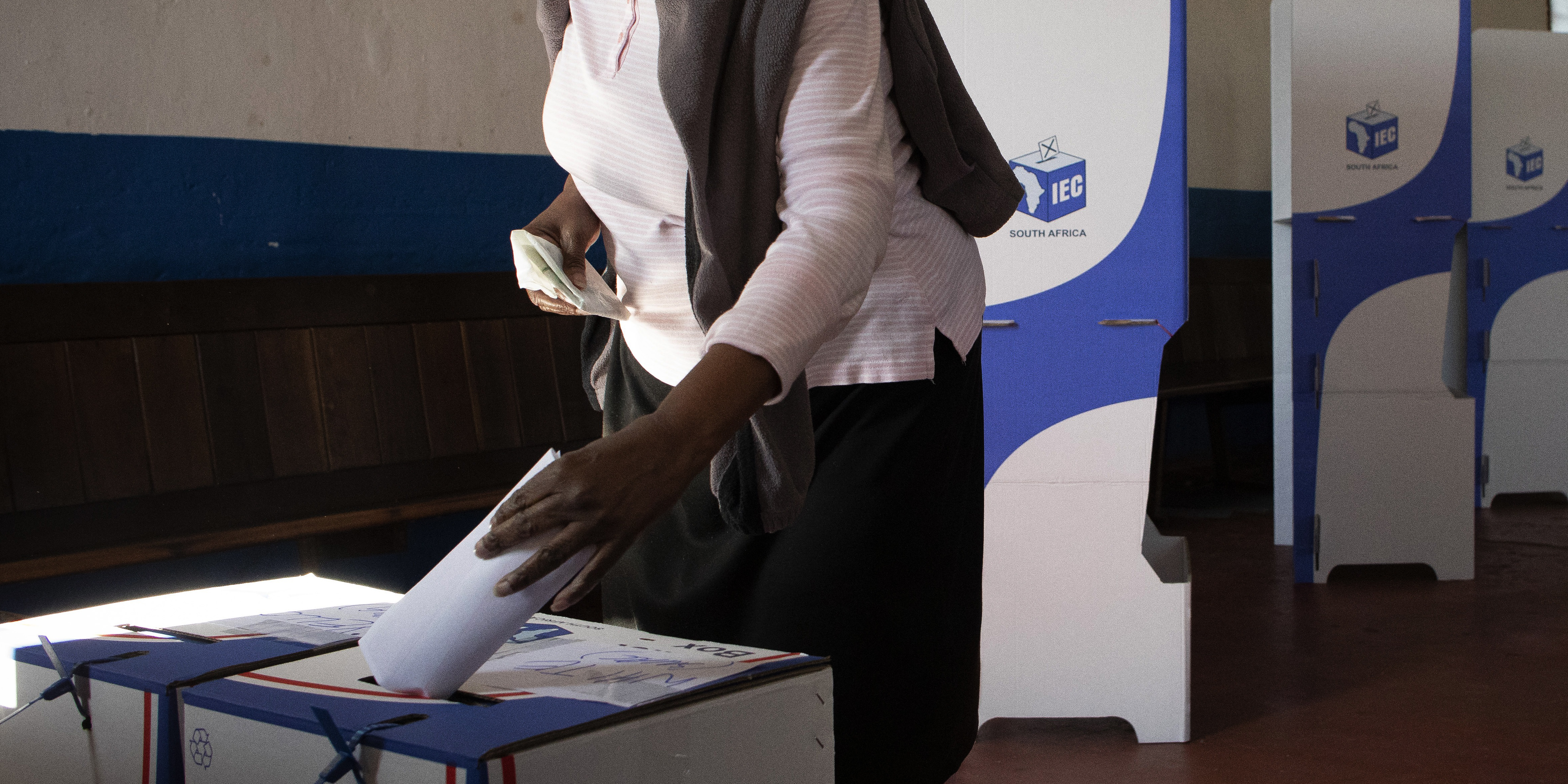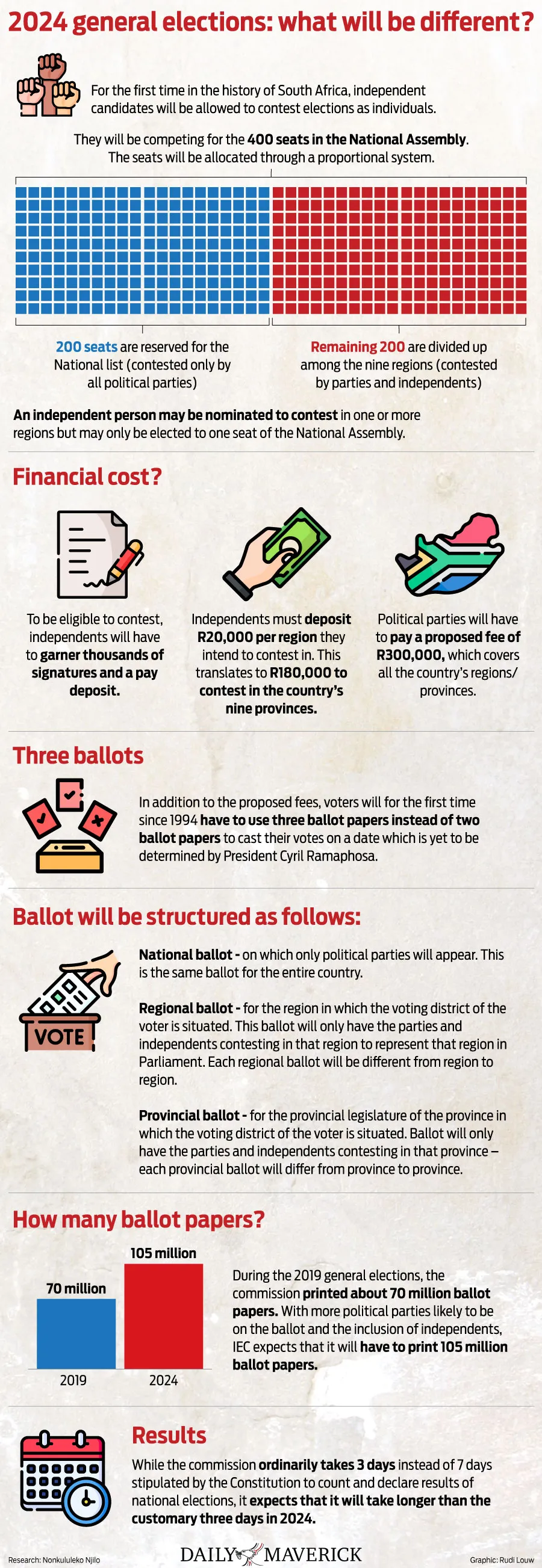ROAD TO 2024 ELECTIONS
SA’s polls timetable ‘cast in stone’, says IEC, urging parties to meet registration deadlines

The Constitutional Court has declined to hear an urgent application in respect of the signature requirements for unrepresented parties contesting the upcoming general election on 29 May. This comes after IEC officials on Monday chided political parties complaining about the signature threshold and submission timeframe.
South Africa’s apex court has declined to hear an urgent application brought by the Rivonia Circle and Mmusi Maimane’s Build One SA (Bosa) regarding signature requirements for unrepresented political parties contesting the 2024 national and provincial elections.
Bosa and the Rivonia Circle approached the Constitutional Court over election signature requirements on 20 December, citing as respondents President Cyril Ramaphosa, the Speaker of the National Assembly, the chair of the National Council of Provinces, the minister of home affairs, the Electoral Commission of South Africa (IEC) and all political parties registered for the elections for the National Assembly.
In December, the Constitutional Court struck out the Electoral Amendment Act’s provision requiring that to stand, independent candidates needed to obtain signatures equivalent to 15% of the votes required to win a seat in the previous election in the province in which they intended to register.
The ConCourt ruled that independent candidates required 1,000 signatures of registered voters to register with the IEC. However, the court did not scrap the 15% requirement for parties which are not represented in any of the legislatures.
On Monday, the court decided not to enrol the matter for an urgent hearing.
“The applicants have failed to show any justification for why they did not bring their application earlier than 20 December 2023. The applicants delayed in lodging their application despite the fact that it was known that the President would in due course proclaim an election date, which might be as early as May 2024.
“The election date has been proclaimed as 29 May 2024 and this Court now finds itself in the position where, if it were to determine the constitutional challenge, it runs the risk of causing disruptions and uncertainty in the preparations for the elections,” read the order.
Read more in Daily Maverick: 2024 Elections Knowledge Base
The ConCourt order followed an IEC press conference on Monday on the commission’s state of readiness ahead of the polls. IEC officials urged political parties to get on with the process of collecting signatures and meeting key deadlines, as outlined in the election timetable.
“When it comes to the pressure that contestants are feeling about the signature requirement, I think it is important to say that — as the Electoral Commission has said previously — the portal for capturing signatures has been open for a bit of time. It was opened on 26 January 2024, so contestants have had quite some time to begin the process,” said IEC Commissioner Dr Nomsa Masuku.
“Anyone who is preparing to contest the election should know that, once an election date is proclaimed the train starts moving, because we have an election timetable.”

A woman casts her vote in a church in Alexandra township, Johannesburg, South Africa, during a previous election. (Photo: EPA-EFE / KIM LUDBROOK)
President Ramaphosa announced the election date last Tuesday, followed by the official proclamation in the Government Gazette on Friday, 23 February.
“The proclamation of the election date has certain legal consequences for the electoral process,” said Chief Electoral Officer Sy Mamabolo. “The first major implication is that the voters’ roll has now closed. This means no further voter registration may take place, either at a local office or online. Voter verifications as well as other validations are currently under way to ensure that there is compliance with the provisions of the law in respect of eligibility to vote.”
The second implication, Mamabolo said, was that the IEC is compelled to publish an election timetable with dates by which political parties must submit their lists of candidates, pay deposits and conduct other salient electoral activities.
Read more in Daily Maverick: Everything you need to know about South Africa’s ‘watershed’ polls and what happens afterwards
Following consultation between the Electoral Commission and the National Political Liaison Committee on Friday, 23 February, the election timetable was published the following day.
“As far as we are concerned, the timetable on the basis of the consultation that we had on Friday was unanimously supported,” Mamabolo said.
Masuku said, “I don’t think it is an excuse to say that the election timetable has caught people by surprise.
“All that we’re saying is that they should continue and press on and collect those signatures as earnestly as they can, because those targets that are in the election timetable are actually cast in stone.”
Below are key election timetable milestones.
Voters’ roll
The provisional voters’ roll was published on 26 February, and an electronic version would be made available at all IEC offices for inspection, Mamabolo said.
According to IEC data, as of 26 February, 27.8 million South Africans had registered to vote — 67.5% of the eligible voting population of 42.3 million people. Mamabolo said the IEC was still verifying the registrations and checking them against the national population register.
“Those who wish to object to the inclusion or exclusion of a voter on the voters’ roll must do so by 4 March 2024. The objections received on or before 4 March 2024 will be considered, investigated and determined by the commission by 11 March 2024,” he said.
Following the determination of voters’ roll objections, Mamabolo will certify and publish the voters’ roll by 12 March.
Candidate nomination
“This is a landmark election marking 30 years of electoral democracy, but it also introduces novel experiences for the voters, such as a third ballot in national and provincial elections as well as the participation of independent candidates for the very first time,” Mamabolo said.
All independent candidates and political parties who intend to contest the general election must submit their nomination requirements by 8 March.
Mamabolo said that at last count there were more than 350 political parties that can nominate public representative candidates. (In the 2019 elections, only 48 of more than 500 registered political parties made it on to the ballot paper.)
“The publication of the provisional lists of candidates goes to the heart of the vote based on informed choices. Therefore, the provisional lists of candidates will be published for inspection on 26 and 27 March.
“With all compliance matters and objections relating to candidates resolved, the Electoral Commission will publish the final lists of candidates on 10 April 2024 and certificates of candidature will be issued to certified candidates on 12 April 2024. The conclusion of the candidate nomination process will set in motion the ballot paper printing project,” Mamabolo said.
Once the list of candidates is finalised, the IEC has the Herculean task of compiling the three ballot papers. With more political parties likely to be on the ballot and the inclusion of independent candidates, the IEC anticipates — at conservative estimates — that it will need to print 105 million ballot papers.
Read more in Daily Maverick: Three ballot papers will be a first for democratic South Africa during next year’s general polls
In-country special votes
South Africa’s electoral system makes provision for voters in special circumstances to cast special votes. The applications for special votes will close on 3 May.
“Those who are infirm and confined and thus unable to reach voting stations must apply to be visited for a special vote at home. On the other hand, those who will not be in their voting districts on 29 May may apply for a special vote to cast ballots ahead of election day,” Mamabolo said.
These special votes will be cast on 27 and 28 May.
Out-of-country special votes
Voters who are registered to vote in SA but will be abroad on election day, or those who are registered abroad but intend to vote in a different country or at a different mission than where they are currently registered must notify the IEC.
An online notification facility (VEC10) is available on the Electoral Commission’s website and will close on 22 April.
Read more in Daily Maverick: Explainer: How to vote in the 2024 elections as a South African living abroad
Special voting at diplomatic missions will happen on either Friday, 17 May, or Saturday, 18 May.
Voting outside of your registered voting station
Mamabolo reiterated the general principle of the election administration “that voters must vote where they are registered”.
“However, in the event a voter intends to be in a different voting district on voting day, such a voter must notify the commission of their intended absence from their voting district and the voting station where they wish to cast the vote,” he said.
A notification portal will soon be launched for this purpose and will close on 17 May. DM



















 Become an Insider
Become an Insider
Let’s hope that they can actually operate a well functioning election this time around without broken equipment and competent staff. I stood outside in the pouring rain for hours in the last municipal elections waiting for the staff to find working equipment.
With signatures required to be submitted by 8 March, I have my doubts that we will have so many small parties. It’s a herculean task. Much less for independents who only need 1000 signatures. The regional ballot could look like a telephone directory.
On the plus side, parties able to meet the ludicrous signatures requirement (originally intended to thwart independents; reduced for them to 1000 by Concourt) have at least demonstrated organisational capacity.
Why ludicrous? Parties that previously had a foot in the door, no matter how tiny, don’t need to do this. Just 1 MP absolves them of collecting signatures.